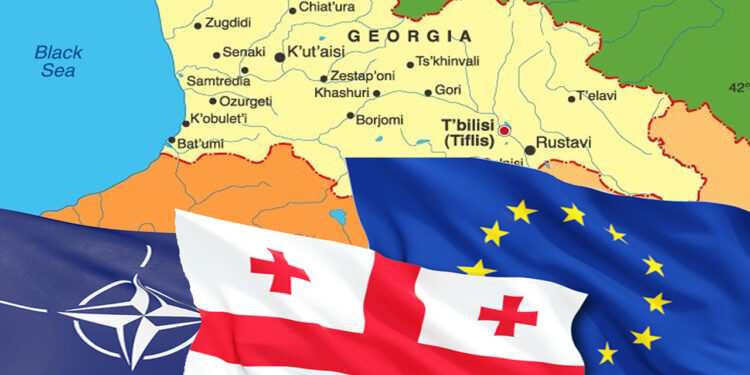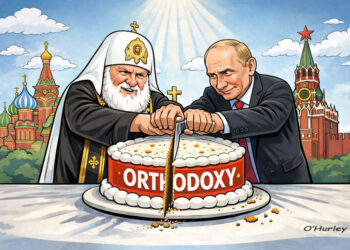by Miceál O’Hurley
TBILISI — 17 June 2022 will haunt Europe for the next decade and beyond. Despite being branded as the “Trio” or “3-Amigos“, Ukraine and Moldova received recommendations for EU Candidate status from the European Commission. Georgia did not.
Given Russia’s proclamation that they intend to “re-occupy and reinforce” former Russian Empire and Soviet territories, long since free and independent States, the decision promises to set-up further conflict in Georgia, encouraging Russian interference and discouraging further domestic progress. The lack of wholehearted embrace by the European Commission will likely be seen as a at best a vacuum and at worst a rebuke. Either way, the European Commission’s decision has resulted in a situation Russia will undoubtedly exploit.
The decision is a gift to Russia. The Moscow mindset sees faint praise as condemnation and the Kremlin has traditionally exploited such situations. Sadly, the European Commission’s decision is tantamount to punishment for the reform-minded and democracy-loving people of Georgia for the failures of their government to move decisively on political, judicial and social reform. In all, the decision does little to encourage the very actions the European Union would find invaluable and does nothing to resolve the problems created by Russia’s illegal invasion and occupation of parts of Georgia since 2008. It is an ill-omen for Ukraine and Moldova who while attaining Candidate status also suffer from long-term Russian occupation, violence and domestic interference.
The refusal of the European Commission to recommend Candidate status to Georgia cannot be viewed outside of the context of the ongoing occupations in Moldova and Ukraine. While occupational challenges did not form the totality of the European Commission’s reservations about Georgia’s place in Europe it remains the elephant in the room. Without question, the backdrop of Russian occupation has marred each of the 3-Amigo’s evolution towards sovereign evolution into becoming the mature democracies to which they aspire.
Unsurprisingly, a reported 120,000 Georgians gathered in the streets of Tbilisi Monday following the European Commission’s recommendation to defer Candidate status to Georgia. The demonstration only served to highlight the divide between East and West where the majority of Georgian people identify as Europeans and yet the failure to decisively pivot towards Brussels has undermined Georgians taking their rightful place in Europe. Monday’s “March for Europe” marks the largest demonstration in Georgia in decades. According to AFP estimates based on drone images, the crowd likely exceeded 120,000 people.
Even the European Commission’s “qualified recommendations” for Moldova and Ukraine marked the duality of conventional wisdom about the importance and timeliness of integrating the 3-Amigos into the European Union. Given Russian Federation President Vladimir Putin’s unequivocally articulation of his belief that Georgia, Ukraine and Moldova and a greater swath of the Baltics and other sovereign states belong to Russia, the tepid language used by the Commission for Moldova and Ukraine, and deferral on Georgia’s candidacy, is a blow to the realisation of the universal European idea and values. Should Russia once again resort to force to “reoccupy and reinforce” its former colonial or Soviet possession, the continued occupation and annexation of the 3-Amigos, and making good on its threat to do the same throughout the Baltics, the European Union may find itself incapable of maintaining its unity or existence. The threat from Russia is an existential one for Europe. Failing to advance Georgia’s integration into Europe, even in a qualified manner, will present new political, social and security threats to Europe in the long-run.
The reasoning provided for deferring Georgia’s candidacy is convoluted. Even a cursory read reveals multiple contradictions and confusing double-talk. Admittedly, the text conveys an initial positive view of Georgia the litany of conditions imposed on Georgia before it could be declared a Candidate for EU membership demonstrates just how little the European Commission believes Georgia is in the running. One might easily mistake the verbiage for a rebuke and not an invitation to engage.
Clearly, Georgia has work to do. That reform remains a pressing concern should be a surprise to no one. What is surprising is how the European Commission conflates the conduct of the reigning Government with the will of the Georgian people. The Government, formed by the Georgian Dream Party, with Georgia’s former Prime Minister, Bidzine Ivanishvili, widely believed to be the party’s “puppet-master,” has long worried Brussels. The commitment to judicial independence and embracing social reforms has often left the European Commission with the notion that Georgia has not demonstrated a sincere desire to join the European Union. Ivanishvili, a billionaire ‘oligarch’ effectively controlling the Georgian Dream Party has proven a barrier to any belief that Georgia has done enough to shake-off the remnants of its past and fully embrace democracy.
Only yesterday, Georgia’s Prime Minister, Irakli Garibashvili, stirred more controversy at the Qatar Economic Forum with his remarks about the prospects of Georgia joining NATO:
“We are not naïve, we understand Georgia has territorial problems, we must solve them first and then become a member of NATO. This is an understanding of our European [partners] and NATO member countries,” the Georgian Prime Minister noted at the Qatar Economic Forum on June 21.
Garibashvili further stunned the panel by attempting to evade clarifying points from the panel moderator, John Micklethwait of Bloomberg News, concerning the Georgian Dream Party’s trust in Putin:
“In 2008, we experienced a large-scale war, in the 1990s when Georgia regained independence, we had two wars in our breakaway regions in Abkhazia and [South] Ossetia… and Russians at that time, 30 years ago, were helping these separatist groups. We fought against Russia three times over the last 30 years, so our government’s policy is to restore territorial integrity and sovereignty through peaceful negotiations.”
The “For Georgia Party’s” Kakhaber Kemoklidze, former security official and ex-Head of the Government Administration, declared Garibashvili’s comments as “damaging” and “a gift to Russia.” Beyond setting lowered expectations for Georgia attaining NATO membership in the near-term, the failure to outright express distrust for Putin following Micklethwait’s attempts to find clarity as a moderator was the great ‘take-away’ of Garibashvili’s remarks.
According to comments made by Kemoklidze on Facebook, Georgia would be better served by following Moldova and Ukraine’s path to “[first] integrate fully into the European and Euro-Atlantic structures” and use Georgia’s integration into these institutions as a catalyst for change before attempting to resolve territorial disputes with the much larger and more powerful Russian Federation which exercises effective control over Abkhazia and Tskhinvali regions of occupied Georgia. Kemoklidze asserts, “[Membership] will increase the pace of the country’s development and its attractiveness. It is the latter that will become the main determining factor in the restoration of territorial integrity.”
Kemoklidze was not the only Georgian in opposition to the Georgian Dream Party to voice his disdain for Garibashvili’s comments. Sergi Kapandze, a Former Deputy Foreign Minister and ex-Vice Speaker of the Georgian Parliament, also voiced concern in a tweet, “[Garibashvili] basically says NO to NATO, claiming that Georgia first has to resolve territorial problems and then join.”
If the past is any indicator, the failure of Georgia to resolve territorial disputes since 2008 gives little hope that absent significant change, the matter will be resolved anytime soon. Garibashvili’s position, if he indeed speaks for the policy of the Georgian Dream Party, belies any assertion that Georgia will decidedly continue on a path towards greater European integration and Western outlook. At a time when the European Commission’s refusal to recommend Georgia’s Candidate status it serves as a rebuke and raises concern as to the future orientation of Georgia.
Candidate status for Georgia could have served as a catalyst for the kind of real change Europe would like to see realised in Georgia. It would have sent a indelible message to Russia that its indiscriminate use of violence to thwart the democratic evolution of its neighbours would not work to their favour. A recommendation from the European Commission, even a highly-qualified one, could only have served the common good of the European Union, Georgia and further signaled that Europe’s future lie in reform and democratic action and will not be stymied by aggression from Russia or others.
The mass, pro-European demonstrations of the Georgian people contrasted with the failures of reform from the Georgian Dream Party, and Garibashvili having thrown water on the prospects of Georgia joining NATO for the time being, the stage is set for an internal power struggle for the future of Georgia and possibly diminishing prospects for Georgia enjoying European Union Candidate status on the near-horizon.
The European Commissions convoluted reasoning about their decision regarding Georgia coupled with the lack of imagination in how Candidate status could have served as the very catalyst to achieve myriad goals continues to highlight Europe’s internal struggle between expansion and the status quo. The best that can be said of the European Commission’s decision is that it doesn’t close the door entirely.
















































